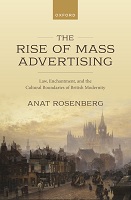The Rise of Mass Advertising
Law, Enchantment, and the Cultural Boundaries of British Modernity
| dc.contributor.author | Rosenberg, Anat | |
| dc.date.accessioned | 2023-10-04T10:18:18Z | |
| dc.date.available | 2023-10-04T10:18:18Z | |
| dc.date.issued | 2022 | |
| dc.identifier | OCN: 1314430492 | |
| dc.identifier.uri | https://library.oapen.org/handle/20.500.12657/76537 | |
| dc.description.abstract | This book is a first cultural legal history of advertising in Britain, tracing the rise of mass advertising circa 1840–1914 and its legal shaping. The emergence of this new system disrupted the perceived foundations of modernity. The idea that culture was organized by identifiable fields of knowledge, experience, and authority came under strain as advertisers claimed to share values with the era’s most prominent fields, including news, art, science, and religiously inflected morality. While cultural boundaries grew blurry, the assumption that the world was becoming progressively disenchanted, itself closely related to concepts of boundaries, was undermined as enchanted experiences multiplied with the transformation of everyday environments by advertising. Non-rational ontologies and a play of mystery became apparent, involving possibilities for metamorphoses, magical efficacy, animated environments, affective connections between humans and things, imaginary worlds and fantasies that informed mundane lifed. These disrupted assumptions that the capitalist economy was a victory of reason. The Rise of Mass Advertising examines how contemporaries came to terms with the disruptive impact by mobilizing legal processes, powers, and concepts. Law was implicated in performing boundary work that preserved the modern sense of field distinctions. Advertising’s cultural meanings and its organization were shaped dialectically vis-à-vis other fields in a process that mainstreamed and legitimized it with legal means, but also construed it as an inferior simulation of the values of a progressive modernity, exhibiting epistemological shortfalls and aesthetic compromises that marked it apart from adjacent fields. The dual treatment meanwhile disavowed the central role of enchantment, in what amounted to a normative enterprise of disenchantment. One of the ironies of this enterprise was that it ultimately drove professional advertisers to embrace enchantment as their peculiar expertise. | en_US |
| dc.language | English | en_US |
| dc.subject.other | advertising, legal history, enchantment, disenchantment, boundary work, history of the press, history of the poster, quackery, gambling, indecency, advertising psychology, modernity, history of capitalism | en_US |
| dc.title | The Rise of Mass Advertising | en_US |
| dc.title.alternative | Law, Enchantment, and the Cultural Boundaries of British Modernity | en_US |
| dc.type | book | |
| oapen.identifier.doi | 10.1093/oso/9780192858917.001.0001 | en_US |
| oapen.relation.isPublishedBy | b9501915-cdee-4f2a-8030-9c0b187854b2 | en_US |
| oapen.relation.isFundedBy | b61300eb-fb65-4e94-9169-fcdbc4f22eed | en_US |
| oapen.relation.isFundedBy | 7b594309-7322-4938-b810-989a6a6d4872 | en_US |
| oapen.pages | 427 | en_US |
| oapen.place.publication | Oxford | en_US |
| oapen.remark.public | Funder name: Berg Institute for History and Law |

